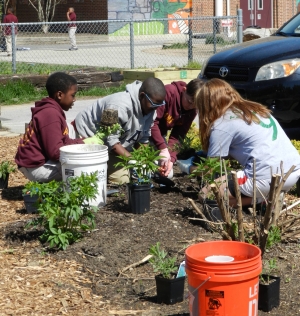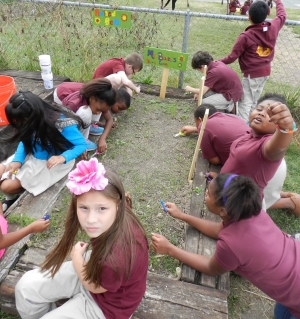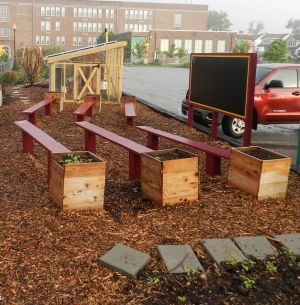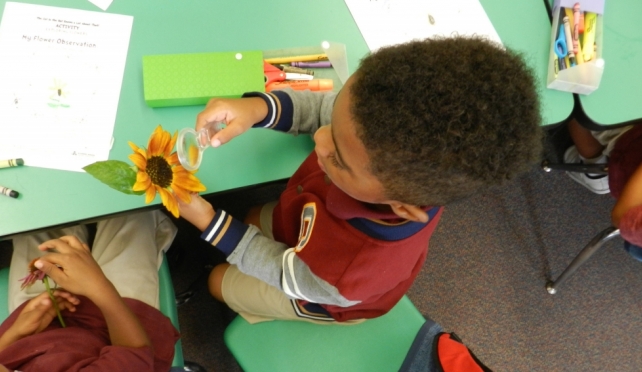By Christy Macy
Looking out a large window on the second floor of Hamilton Elementary Middle School, I see a sports field surrounded by fruit trees on the left. Not far from the school parking lot is a large perennial bed where 250 flowering plants lie dormant during the winter months. Nestled beside it is a raised garden bed filled with still green if somewhat bedraggled vegetables. A small hut is covered with succulents donated by a local green roof company. Two chickens, Sugar and Spice, are housed in a wooden chicken coop nearby. Large painted red benches serve as an outdoor classroom – especially popular on warm spring days. At the back of the school property on the right is a rectangular vegetable bed and a compost pile. To the left is a large hooped garden owned by a local grower who shares his expertise with the kids and his produce with the local food shelter. A newly-built shed is filled with rakes, hoes, gloves, and other gardening equipment.
The guiding spirit and entrepreneurial wizard behind the school’s remarkable “greening” efforts is Scott Hartman, Hamilton’s science teacher who is getting his more than 700 kids excited about what growing and farming and healthy living are all about. On this particular day, the desks in Scott’s classroom are covered with cement squares which his students have been decorating with colored tiles. They will be used as stepping stones for the path through the school’s perennial garden.
When asked what sparked this passion for gardening and working outdoors, Scott told me he had grown up in rural Pennsylvania, exploring the countryside and working in his family’s extensive garden. “My brothers and I sold the strawberries we grew at a roadside stand every summer,” he added with a grin.
As a budding science teacher, Scott began to visit Great Kids Farm (GKF) a number of years ago, and loved it from the start. He is currently enrolled in the Farm’s professional development program called Healthy Eating and Healthy Living (HEHL) that works with school teachers across Baltimore City to enrich their science classes and strengthen their curriculum. He points to the plants growing under artificial lights on one side of his classroom, and an aqua-ponic garden on the other, as some of the many resources he’s gained through the program. Last fall, his students harvested nearly 50 pounds of radishes from the raised vegetable bed that GKF helped them build. “It was a real bumper crop,” he says, “and when I asked people at the Farm what I should do with all of this produce, they gave us some wonderful recipes for radishes that the kids loved.”
 In addition to the yearly trip to the Farm with his students, Scott says the many resources it offers – like the seedling give away -- is a great boon to teachers who have taken on the challenge of building the raised gardens at their schools. The GKF lesson plans are also very useful, he says. So is the opportunity to get to know some of the other science teachers throughout the school system who are participating in the HEHL program. Most of all, he says, his engagement with the Farm as a young science teacher has been a big “confidence builder” over the years. “It was a daunting idea to get kids, particularly the youngest ones, interested in working in a garden, particularly since so few of them ever go outside and play in their neighborhoods,” he says. “At the Farm, I saw how it was possible to make my kids feel safe in an outdoors environment, and get them excited about growing something.”
In addition to the yearly trip to the Farm with his students, Scott says the many resources it offers – like the seedling give away -- is a great boon to teachers who have taken on the challenge of building the raised gardens at their schools. The GKF lesson plans are also very useful, he says. So is the opportunity to get to know some of the other science teachers throughout the school system who are participating in the HEHL program. Most of all, he says, his engagement with the Farm as a young science teacher has been a big “confidence builder” over the years. “It was a daunting idea to get kids, particularly the youngest ones, interested in working in a garden, particularly since so few of them ever go outside and play in their neighborhoods,” he says. “At the Farm, I saw how it was possible to make my kids feel safe in an outdoors environment, and get them excited about growing something.”
In addition to his skills as a teacher, Scott is clearly a talented entrepreneur who spends a lot of time writing grants for additional resources for his growing gardening empire. He’s even teaching his older students how to write grants as part of their science studies. The tools in the woodshed out back are almost all donated or the result of a local grant. The benches for the outdoor classroom were donated and then painted by the students. Scott has also started a popular garden club with his elementary school students that is focused on growing, nutrition, and food preparation. He wants to take them out to the Farm this spring.
Scott is aware that sometimes his classes can have a deeper impact on young lives. He talks about one of his students who has been “unreachable” over the past few years. His 6th grade was particularly tough, says Scott, when he broke off his relationships with most of his friends and teachers. But this particular teenager knows a lot about being outdoors and loves the garden. “I’ve seen him pick up and play with a snake; he’s not afraid like so many of my students,” says Scott. “We’ve spent a lot of time together. Now he’s working with me in the classroom when I have the younger kids, and he shines in that role. He’s my stand out student who has benefited from the gardening program in ways I could not have imagined.”
“I have a lot of hopes for my students,” says Scott. “I want them to be well rounded, and know how the world works. I want them to know about how to lead healthy lives, and to understand why it’s important to stay away from much of the food and drinks that many of them still consume. Being able to teach them how to grow and harvest foods that are good for them plus all of these additional resources helps me reach those goals.” I watch Scott drive out of the school parking lot in his red pickup truck and wonder what exciting new science project he’s thinking up next.


